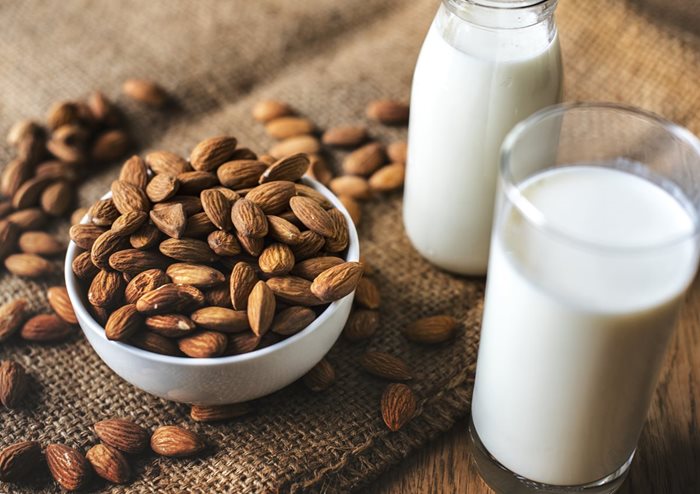Our consumer survey sheds light on consumer perceptions of the many plant-based dairy alternatives available and how coffee shops best promote plant-based milks to consumers accustomed to dairy

Just 5% of survey respondents identified as vegan, yet over 60% indicated they had tried plant-based milk in coffee shops
As the health and wellness trend continues to gain traction in the UK, once niche plant-based dairy alternatives (PBAs) are now commonplace on the high street. No longer the preserve of specialist operators, major branded coffee chains such as Costa Coffee, Starbucks, Caffè Nero and Pret A Manger all offer a permanent range of dairy-free milk options.
Having a diverse and inclusive alternative milk menu that caters for the rising number of flexitarian, vegetarian and vegan diets in the UK is essential for successful coffee shop menu today. But what are consumer perceptions of the myriad dairy alternatives available and how can coffee shops best promote plant-based milks to the uninitiated?
Why do consumers purchase plant-based dairy alternatives in coffee shops?
Just 5% of survey respondents identified as vegan, yet nearly three-quarters of consumers surveyed (72%) indicated they have tried a PBA, with 60% confirming they have tried these products in a coffee shop. Given that 61% of consumers surveyed identify as including meat and dairy in their diet, PBAs could represent a significant sales opportunity across a broad range of coffee shop consumers.
Cited by 23% of consumers surveyed, health and wellness is the primary motivation for purchasing a plant-based milk in a coffee shop – ahead of those purchasing because of intolerances or allergies (22%) and dietary preference (15%). This indicates the appeal of PBAs has broadened beyond health necessity or lifestyle choice, with these products attaining mainstream appeal.
The development of so-called ‘barista style’ PBAs, which better mimic the texture and foam of dairy, usually through the addition of plant-based oils, has further increased adoption among artisan and specialty coffee shops. Twelve percent of consumers who have never tried a PBA in a coffee shop would be encouraged to do so if these products better emulated the interaction between dairy milk and coffee.
Although environmental and ethical issues surrounding food production have risen to prominence in the media over the last 12 months, just 11% of consumers surveyed cited animal welfare concerns as an explicit motivation behind PBA purchase, with just 5% citing environmental concerns.
Barriers to purchase
Perhaps unsurprisingly, 43% of consumers who have never tried a plant-based milk in a coffee shop indicate they simply prefer the taste of dairy milk. With most coffee shops charging a premium of around 50p-£1 for dairy alternatives, these products are also often perceived as poor value for money compared to dairy – 51% of consumers indicate unease at having to pay more for a plant-based milk option. Among consumers who have never tried dairy milk alternatives in coffee shops, pricing PBAs at the same point as dairy polled second highest out of measures that would compel them to do so, ahead of improved taste.
Among consumers who have never tried plant-based milks in coffee shops, a free sample was cited as the greatest motivator that would compel them to do so. This indicates that except for those who simply prefer the taste of dairy, a lack of knowledge or prior exposure to dairy alternatives is a major barrier to consumption among consumers unmotivated by dietary preference or necessity. Better information about different plant-based milks available was chosen in 12% of cases, indicating that prominent menu listings and increased in-store visibility could help to improve sales.
Top polling plant-based milks in UK coffee shops
Soy
Soy still rules the roost when it comes to PBA awareness, with a whopping 73% of consumers surveyed indicating they have tried this dairy alternative in coffee shops. First developed in China in the 14th Century, modern soy milk has been a popular dairy substitute for decades and has comparable nutritional content to dairy.
Almond
Sixty-three percent of consumers surveyed have tried almond milk in coffee shops, making it the second most tried PBA among consumers surveyed. Low in calories and high in antioxidants, almond milk was one of the first dairy alternatives to be widely adopted by artisan and specialty coffee shops.
Coconut
Polling as the third most popular PBA among consumers at 60%, coconut milk works well mimicking the rich and creamy mouthfeel of dairy where other PBAs can feel watery. A high saturated fat content and distinctive taste is, however, a drawback for some. Nevertheless, indicating coconut milk’s ascendance to the mainstream, the UK’s largest coffee chain, Costa Coffee added the dairy alternative to its menu in January
2018.
Oat
Forty-eight percent of consumers surveyed indicated they had tried oat milk in a coffee shop. Lauded by baristas for a neutral taste that does not impede delicate coffee profiles and a close resemblance to the consistency of dairy, oat is often cited as the go-to PBA among specialty cafés.
The Plant-based Poll canvassed the opinions of 1,020 UK consumers in April 2019